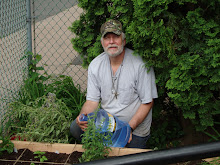
If you live in a climate a little more moderate than New England, you might actually see something like this in your own garden! My tomato plants are still seedlings just put outdoors and are about 1-2 " tall!
Today I am meeting a group of "volunteers from the street" to build a small herb garden for a local soup kitchen, and agriculture (and this weeks parabales) are full in my mind. I can't leave the week of Pentacost without reflecting again on the origins of this festival as a celebration of the first fruits of the seasons. Here is a prayer I found, author unknown, from the middle ages for the Feast of Weeks (Shavuot - Pentacost), with a link below it.
I will always remember the wonderful deeds of the Lord
When Israel was in Sinai,
When Moses led the people out of Eqypt into freedom.
They stood purified at the foot of the mountain
To receive your Law, your holy Law; which they swore to obey forever.
And Israel was a holy nation among nations
A holy thing and precious to the Lord.
High on the mountain, your voice was heard, o Lord,
Revealling many things
And then the blind saw your light and the deaf heard your words,
While those who could not speak opened their mouths to recount your grace.
And then, o Lord, you revealled yourself
To those who had sought you, and you said:
I am your rock, the shield and your defense, the one and only God.
You appeared in majesty, glory and splendor,
To deliver your commandments,
And young and old alike were surrounded by the same glory
That surrounds you
And still today in my heart and soul and in my every thought
I profess the wonders that you, o Lord, perform.
(
http://www.rc.net/wcc/readings/shavuot.htm)
-------------------Daily office year two:Prov. 25:15-28; Psalms 30, 32, 1 Tim. 6:6-21; Matt. 13:36-43








